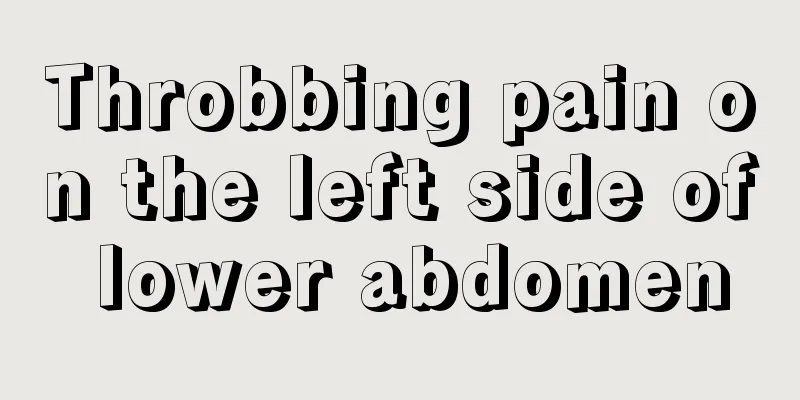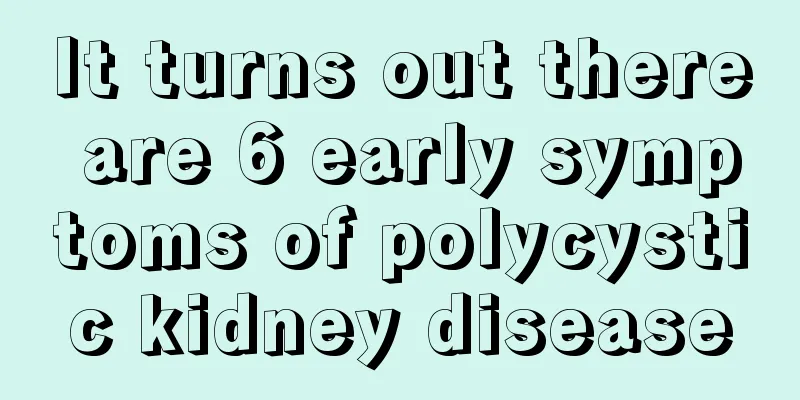Throbbing pain on the left side of lower abdomen

|
There are many reasons for the symptom of throbbing pain on the left side of the lower abdomen. It may be caused by prostatitis, menstrual complications, gynecological inflammation, etc., and excessive exercise can also cause abdominal pain, nerve spasms, etc., so everyone should choose a treatment method according to the cause of the throbbing pain on the left side of the lower abdomen. Below is an introduction to the causes of throbbing pain on the left side of the lower abdomen. You can read the content. 1.1 Causes of dull pain in the lower abdomen of men The reasons for dull pain in the left side of the lower abdomen in men are as follows: Most of the long-term dull pain in the lower abdomen in men is caused by men's diseases. Male friends must be careful. Lower abdominal pain may be caused by prostatitis, such as prostatitis. Another reason may be that repeated ejaculation of the testicles causes fatigue, which in turn affects the nerves inside the testicles, causing men to feel lower abdominal pain. 1.2 Causes of dull pain in the lower abdomen of women The reasons for the dull pain in the left side of the lower abdomen of women are as follows: in addition to periodic menstrual pain, gastrointestinal dysfunction and other reasons, women also have endometriosis. That is, the cells in the uterus will gradually grow to places outside the uterus, such as the fallopian tubes, ovaries, and outside the bladder. This will cause these cells to bleed slightly at the end of the period, and cause them to spread to the external area and become inflamed, thus causing damage. Ovarian cysts. Ovarian cyst refers to a lump surrounded by fluid in the uterus. The developing egg may be surrounded by the cyst fluid, causing the ovary to swell and cause pain. 2. Key points for diagnosis of lower abdominal pain First, look at the location of the lower abdominal pain, which is generally divided into the middle of the lower abdomen, unilateral lower abdomen, and bilateral lower abdomen. Pain in the middle of the lower abdomen is mostly caused by uterine lesions, which is less common. Pain on one side should be considered as uterine adnexal lesions on that side, such as ovarian cyst pedicle torsion, acute inflammation of the fallopian tube and ovary, ectopic pregnancy, etc. Pain on the right side of the lower abdomen should also be considered as acute appendicitis. Bilateral lower abdominal pain is common in pelvic inflammatory disease. Second, look at the nature of the lower abdominal pain - persistent dull pain is mostly caused by inflammation or fluid accumulation in the abdominal cavity; persistent pain is unbearable, and is often caused by advanced reproductive organ cancer; third, look at the timing of the lower abdominal pain. If there is dull pain on one side of the lower abdomen in the middle of the menstrual cycle, it should be considered as ovulation pain; abdominal pain during menstruation may be primary dysmenorrhea or endometriosis; periodic lower abdominal pain without menstruation is mostly caused by obstruction of menstrual blood discharge, which is seen in congenital reproductive tract malformations or postoperative adhesions of the uterine cavity and cervical canal. 3. Precautions for taking medication for abdominal pain Pregnant or breastfeeding women should use scopolamine, propantheline and belladonna with caution. When children have abdominal pain, parents should not buy medicine for their children themselves, but go to the hospital for treatment in time. Abdominal pain in the elderly is often atypical. Because the abdominal muscles of the elderly are weak and their reactions are poor, sometimes the condition is very serious but they may still not feel it. Therefore, the elderly should not take medicine casually for abdominal pain, but should go to the hospital for examination and treatment. Scopolamine is contraindicated in patients in the acute stage of cerebral hemorrhage, glaucoma, prostatic hypertrophy, urinary retention and reflux esophagitis. Propantheline is contraindicated in patients before surgery, glaucoma, prostatic hypertrophy, reflux esophagitis, heart disease, liver damage and hypertension. Belladonna is contraindicated in patients with glaucoma, urinary retention, prostatic hypertrophy and tachycardia. |
<<: My stomach always feels like something is blocking it
Recommend
Several common causes of esophageal cancer
The esophagus is a part of the human body, and tu...
How long can you live after laryngeal cancer surgery?
According to relevant reports, the 3-year surviva...
Why can’t you have sex before having an IUD inserted?
Ladies, if you want to have an IUD, you must lear...
Lumbar disc herniation compresses nerves, early treatment reduces harm
Lumbar disc herniation can cause pain. Some patie...
How to treat bad breath caused by chronic pharyngitis
Chronic pharyngitis is relatively common in daily...
What to do with heel gout
Heel gout is actually a phenomenon of joint pain,...
What are the symptoms of low white blood cell count? It turns out to be like this
Low white blood cell count is a common condition ...
The best work and rest schedule for the human body
If we want a healthy body in our lives, we must h...
Will eating only meat and no vegetables cause colon cancer?
I am 45 years old this year. Because of my work, ...
Can jackfruit be put in the refrigerator?
There are many ways to preserve jackfruit. It can...
Low temperature plasma removal of tonsils
We all know that the human tonsils are part of th...
What is antenatal depression?
Prenatal depression can be said to be a psycholog...
Is it moisture when blood clots are pulled out from a blood cup?
Cupping is a traditional Chinese medicine health-...
How much does chemotherapy for endometrial cancer usually cost?
Endometrial cancer originates from malignant tumo...
Can stomach cancer be diagnosed without gastroscopy?
Can gastric cancer be diagnosed without gastrosco...









